Hoa Binh and Northern Vietnam’s Must See Hidden Gems
A Northern Vietnam travel guide revealing the breathtaking province of Hoa Binh. This is a guest post written by Liezl Bruwer, a South African expat living and teaching in Northern Vietnam. She lives, travels and eats vegan with her partner Andy.
Hoa Binh is becoming the next Halong Bay. It’s nestled away in an incredible display of mountains and rice paddies. It’s home to the largest manmade lake in Vietnam. Hoa Binh is directly translated to peace, and this province provides nothing else.
Where to Travel in Hoa Binh
Within Hoa Binh are Mai Chau and Pu Luong National Park. They are the more known villages for tourists to visit in Hoa Binh. Yet‘more known’ is still quite a stretch for these untouched gems in Vietnam’s booming tourist economy.
Hoa Binh province is home to many ethnic minorities. The most predominant are the Muong people as well as the Black and White Thais. The Ethnic Thais live in the valley of Mai Chau and the Muong live on the other side at the base of the mountains
Mai Chau
Mai Chau is a small village only 150km away from Hanoi. It’s roughly a 4.5 hour drive from the Old Quarter in Hanoi. As you sit there amongst the fresh green paddies and rugged mountains, you feel worlds away from the busy streets of Hanoi.
The Thai influence makes for beautiful stilt houses with well kept yards and gardens. You can stroll or take a bicycle through the different villages of Ban Pom Coong, Ban Lac 1 and Ban Lac 2.
Things To Do in Mai Chau: If you are a lover of all things green, fresh and peaceful, then Mai Chau is a great stop. Bike rides through the rice paddies and villages are a great way to soak up the scenery and local culture. We had a great time exploring all the roads in the valleys and stopping at little cafes for a Vietnamese coffee. Most places you stay at offer free bicycles to use as your please.
On our second trip to Mai Chau we did something more adventurous: a rock climbing tour with Asia Outdoors. Andy and I were both first timers. They were exceptionally helpful and encouraging, especially when I was half way up and ready to go back down. My arms had turned into jelly! I felt really pumped after that climb. With the help of the team I broke through my own limitations and made it to the top.

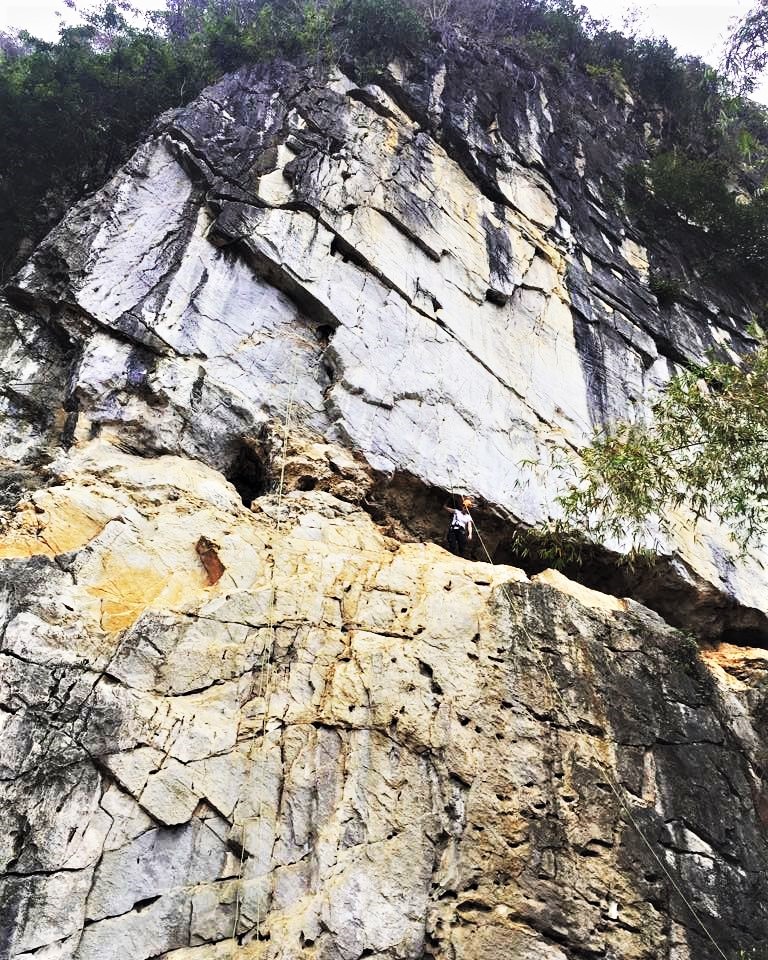
Where to Stay in Mai Chau: I recommend Mai Chau Sunrise Village for budget backpackers. The rooms are clean and the bed is comfy. We had a veranda and spent time admiring the surreal views of the rice paddies and mountains there.
The majority of the homestays in Mai Chau are in the villages of Ban Lac and Pom Coong. They are built close to one another to form a community of stilt houses. They are beautiful at night with fairy lights hanging in the trees. There are one or two homestays further out in the paddies. This would be up to your preference to how isolated you want to be. The general view in Mai Chau is of rice paddies and epic mountains so no matter where you stay it will be beautiful.

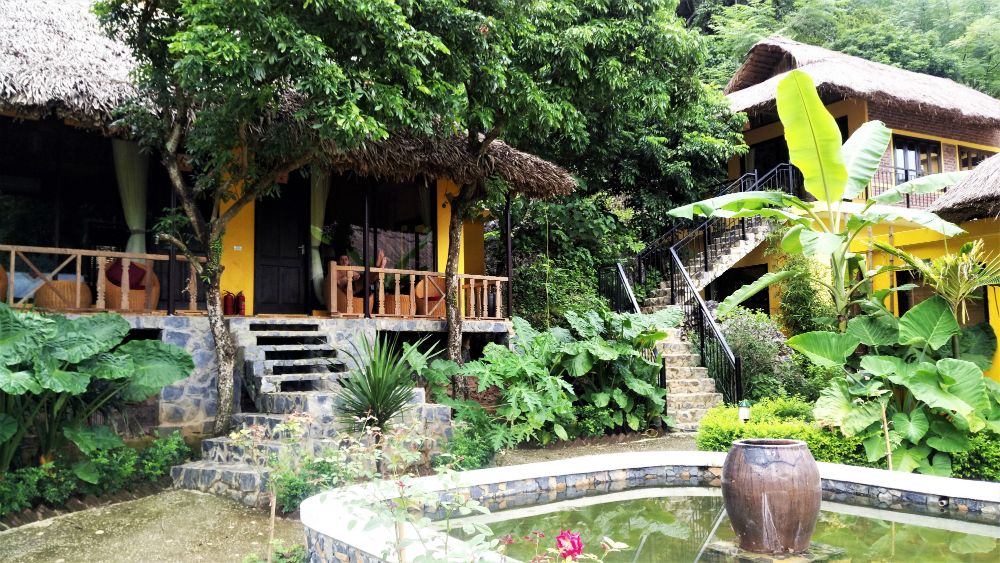
There are two upper range resorts in Mai Chau, Mai Chau Eco Lodge and Sol Bungalows. We frequented Mai Chau Eco Lodge as they had a great pool surrounded by mountains. The pool costs 200,000 Dong ($9) for non-guests.
What to Eat in Mai Chau: Though being vegetarian in Vietnam is easy, being vegan can be more challenging. In Mai Chau we were pleasantly surprised that it was possible to find vegan options. The main food available for vegans in Mai Chau is fried tofu cooked with fresh tomatoes and and spring onions. This can be found at most places. We usually ordered this with some steamed rice, veggie spring rolls and the vegetables of the day. Check before ordering spring rolls that they don’t contain egg if you’re vegan.
How to Get to Mai Chau: It’s super easy to get to Mai Chau from Hanoi. We have a friend at the Hanoi Old Town Hotel, Sara Lee who helped book us a tourist bus to Mai Chau. It cost us 200,000 Dong to get there and took about 4.5 hours. You could probably book a bus from any hotel/backpackers in Hanoi for the same price.
Buoc Village
Buoc is a tiny village nestled away in the mountains surrounded by a network of other villages. Some so small there are no signs to indicate their names. There isn’t much information available on Buoc Village. Probably because it is in the middle of nowhere and as such is unfrequented by foreigners. I stayed here for a week with my partner and loved it. We got to explore this area that has retained a lot of the rural charm and Vietnamese way of life. If you are comfortable to go on your own explorations with only Google Maps to guide you, this is your kind of place.
Things To Do in Buoc Village: Cycle around Buoc and the surrounding villages. The weather was in our favour, not too hot but not too cold. We were met with so many passing ‘hellos’ and smiles. We were even ushered into a local’s home for some “happy water”. Andy braved it and had half a glass. I couldn’t make it past a sip – home brewed rice wine is not for the fainthearted!

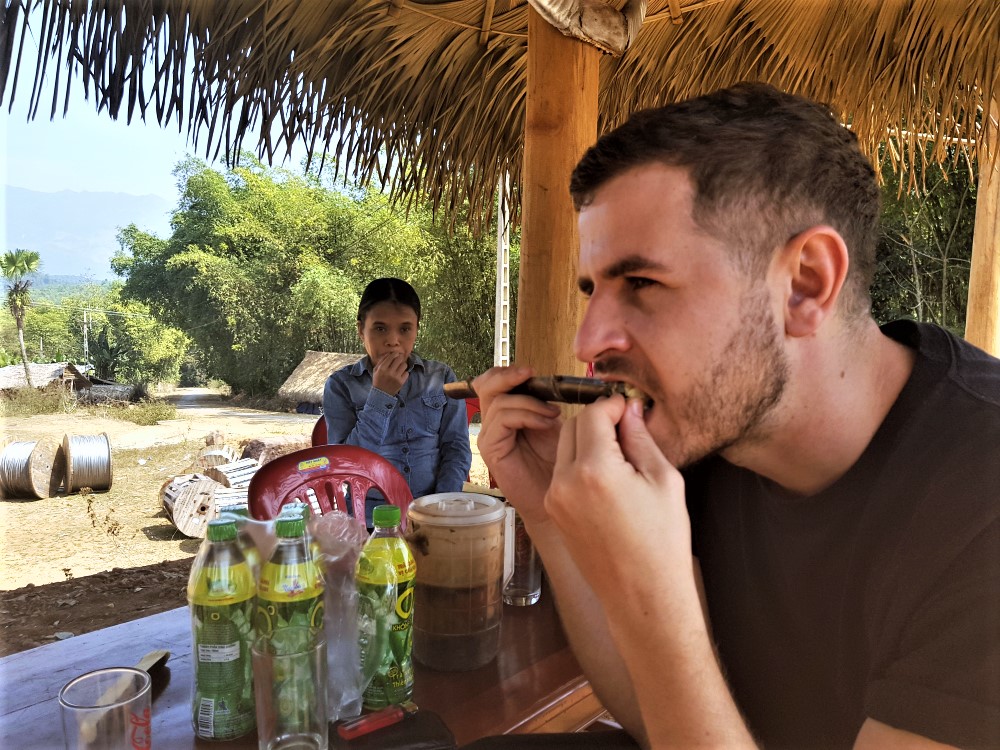
Next up, trekking. We had scoped out a path that led over the river into the mountain and went the next day to see where it led. We followed the path up into the mountain and came out into an amazing bamboo forest. This opened up into a small path that led through a denser bush and then alongside rice paddies. We had gone toward the end of the dry season so all the paddies were muddy. I imagine September through November would be an absolutely spectacular picture of bright green paddies and lush mountains.
Where to Stay in Buoc Village: We stayed at a cute little place called La Maison De Buoc. The room was basic but clean and a good bed (with fantastic pillows!) It had a nice veranda that overlooked the garden with a slight view of the mountain at the back. I have a feeling that Le Maison De Buoc only receive people over for tours so no longer than a night or two. When we asked them what there was to do around the area and they couldn’t tell us much. Their lack of information pushed us to make our own way. In the end I enjoyed the sense of adventure in not knowing where we were going.

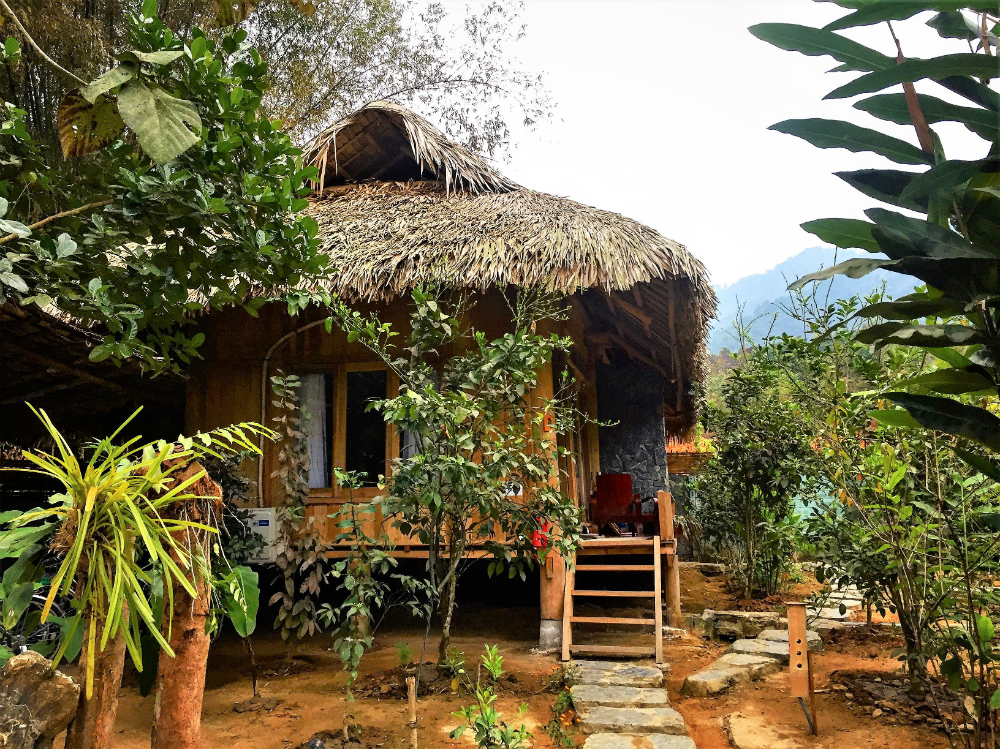
What to Eat in Buoc Village: We didn’t eat anywhere else other than at Le Maison De Buoc. Primarily because there are no other places to eat in the Buoc Village! We had told the manager ahead of time that we were vegan and what that entailed and so they catered just for us. Again, we had the standard tofu in tomato sauce with steamed rice, veggie fried spring rolls, vegetables and toasted peanuts. We both enjoy these local dishes so had no problem eating this for a week. My only qualm would be that the chef used way too much oil.

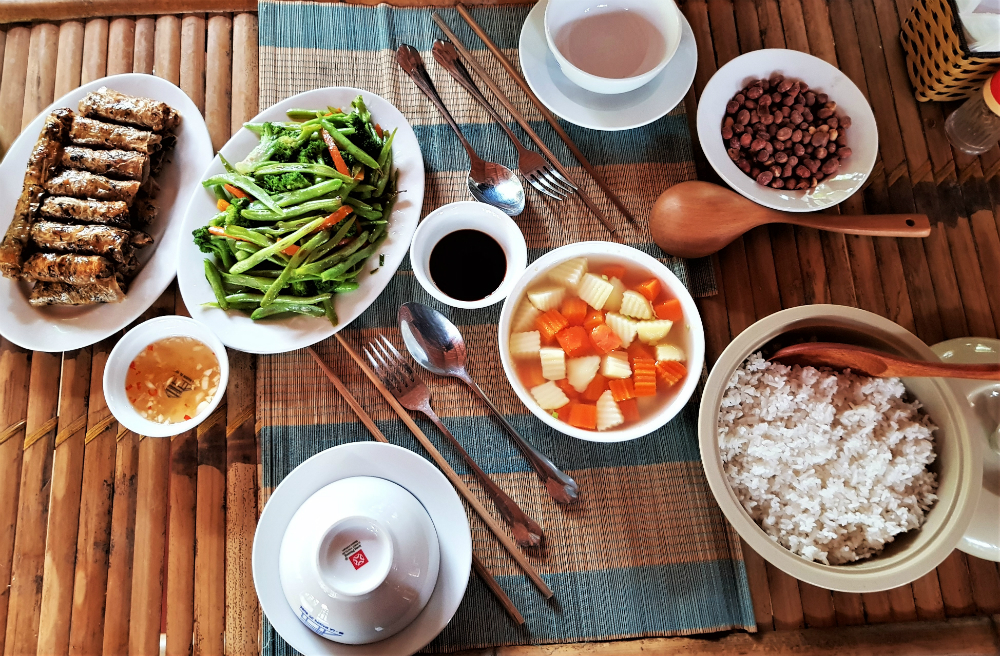
How to Get to Buoc Village: The second time we went to Hoa Binh we went directly to Buoc Village. Le Maison De Buoc offers a tour bus from Hanoi. It picked us up at The Pan Pacific in Hanoi. We went to Mai Chau and from there we took another bus for about 20 minutes to Buoc Village.
Pu Luong National Park
Vietnam has plenty of national parks, but what sets Pu Luong out from the rest is how untouched by tourism it still is. It has grown since the last time we were there, so we expect that in a year or two it may be a more well known route to travel. Vietnam’s national parks are known for their beauty and Pu Luong is no exception. It has incredible views of mountains and rice paddies. Views that you can stare at for hours. Views that make you feel so insignificant but at the same time so connected to all that is.

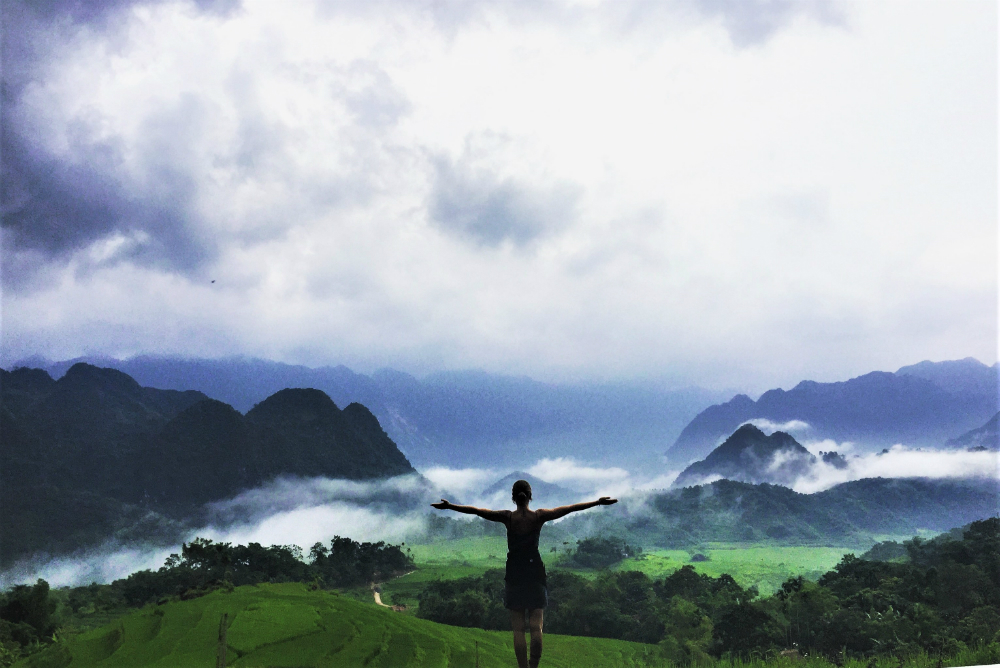
Things to Do in Pu Luong: At our accommodation, Pu Luong Treehouse, our hostess Ms Zoom directed us on walks through the local area. Ms Zoom is super passionate about travelling and showing her guests a great time. She took us out on a motorbike ride through villages and roads that are only known by locals. We stopped off at the Ma River and took a boat ride to a waterfall. There we enjoyed beers with some locals that had gathered together for Tet (Tết Nguyên Đán is the Lunar New Year which falls over the same time as Chinese New Year).
Where to Stay in Pu Luong: The first time we went to Pu Luong we had decided to take a day trip and make a stop at Pu Luong Retreat for lunch. However once we had stopped there, we were in awe of the views and landscapes in the area. We decided to be spontaneous and stay the night to enjoy the pool area and the menu. Pu Luong Retreat is one of the most popular places to stay amongst older travelers and for a reason: it’s beautiful. It’s quite pricey at $70 per night but worth a stay to appreciate the views.
The second time we went to Pu Luong we were invited to stay at a newly opened retreat called Pu Luong Treehouse. It’s one of the best places I have stayed in Vietnam. Our hostess, Ms Zoom, started the project from only a piece of land and she makes sure you feel at home from the moment you walk into her secret slice of heaven. She has set it up so that every detail is thought of and anything you would need would be available. A traveller herself, she knows what matters. Her showers are some of the best I have had in Vietnam, even beating my own home in Hanoi! The heartfelt touch of Ms Zoom and her care is what I appreciated the most about her accommodation.

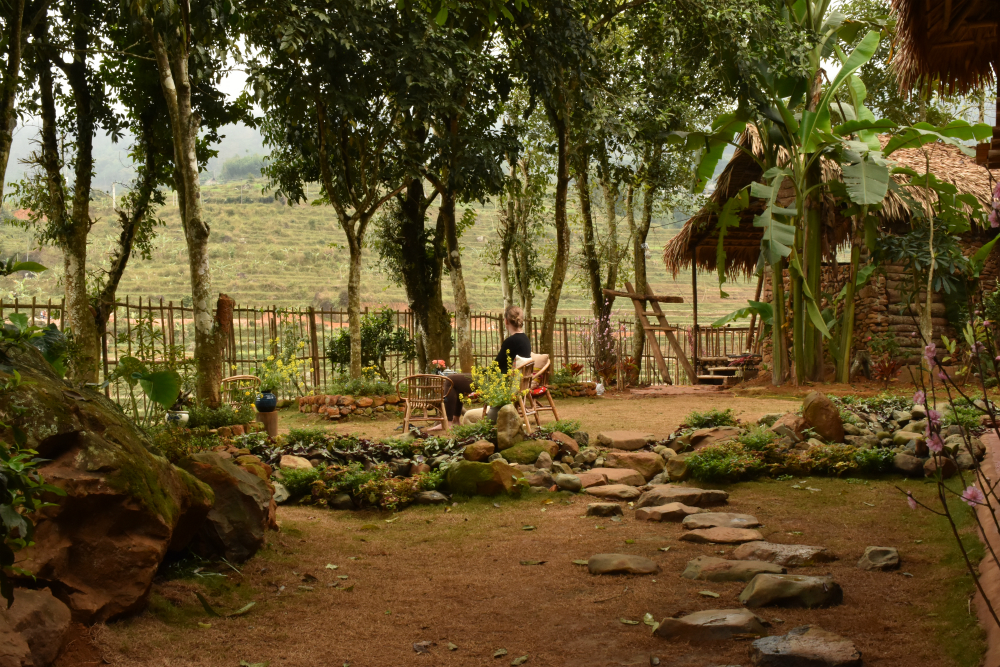
What to Eat in Pu Luong: There are not many places up in Pu Luong nature reserve so eating options are limited. While staying in Pu Luong Nature Reserve we enjoyed slow cooked tofu in a clay pot. It was truly delicious. They also have the usual veggies, rice and spring rolls.
Whilst staying with Ms Zoom we enjoyed some delicious vegan Vietnamese cuisine with a western touch. She cooked us a great potato veggie fritter that Andy and I battled over, and a phenomenal banana flower salad which is a traditional salad in Vietnam made with banana leaf, peanuts, coriander, sliced carrots, and a touch of chilli and lime. We felt healthy and nourished whilst staying at Pu Luong Treehouse.

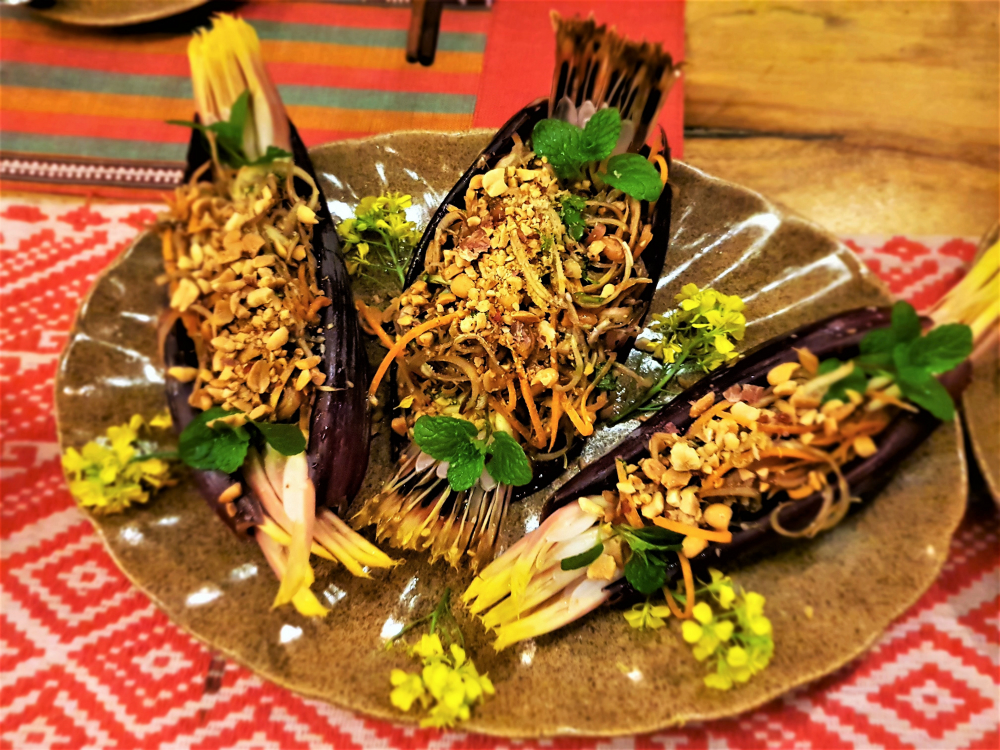
How to Get to Pu Luong: Unfortunately, getting to Pu Luong is not as easy as Buoc or Mai Chau. The first time went by motorbike and the views were breathtaking. It is quite long and windy so if motorbikes are not your jam then you can go by private car.
The second time we had more luggage and so we opted to take a private car. We were told at the previous accommodation that it would cost 200,000 Dong but when the taxi arrived it turned out to be 800,000 Dong. The only other option was a tourist bus. However the only one was running from Pu Luong Retreat and they would not allow us on board as we were not guests.
In the end, Hoa Binh is a place to be discovered. If you are looking for easy travel and everything completely mapped out, then this adventure may not be for you. However, if you want to take the reigns and carve out new paths and relationships with locals, go explore these hidden gems in Northern Vietnam. Be prepared to see, feel and experience some beautiful things that few places can offer.















![Toni Kroos là ai? [ sự thật về tiểu sử đầy đủ Toni Kroos ]](https://evbn.org/wp-content/uploads/New-Project-6635-1671934592.jpg)


